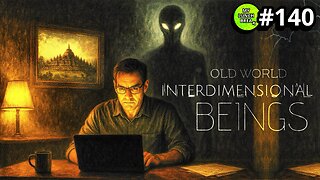Premium Only Content

Episode 1971: Embracing Faith in the Face of Turmoil
Embracing Faith in the Face of Turmoil
Welcome back to another episode we delve into the intersection of faith, culture, and society from a conservative Catholic perspective. Today, we're drawing inspiration from two profound quotes that offer guidance and solace in turbulent times from two spiritual men St. Vincent de Paul and Fr Raoul Plus, S.J
"We should take as a maxim never to be surprised at current difficulties, no more than at a passing breeze, because with a little patience we shall see them disappear. Time changes everything." These words, spoken by St. Vincent de Paul, resonate deeply in our hearts, urging us to maintain steadfastness in the face of adversity. As faithful Catholics, we understand that challenges are an inevitable part of life's journey. Yet, it is precisely through these challenges that we have the opportunity to grow in faith and resilience.
Let's break down this quote from St. Vincent de Paul from a traditional Catholic perspective:
"We should take as a maxim never to be surprised at current difficulties": In the traditional Catholic understanding, life is seen as a pilgrimage filled with trials and tribulations. Difficulties are to be expected as part of the fallen nature of the world due to original sin. Rather than being caught off guard by them, Catholics are encouraged to accept difficulties as a natural part of the human experience.
"No more than at a passing breeze": This comparison suggests that difficulties, no matter how challenging they may seem at the moment, are transient and temporary. In the grand scheme of eternity, they are fleeting and insignificant. This echoes the traditional Catholic teaching on the transient nature of earthly life compared to the eternal life that awaits believers in heaven.
"Because with a little patience we shall see them disappear": Patience is a virtue highly valued in traditional Catholic spirituality. It is through patience that one endures trials with fortitude and trust in God's providence. St. Vincent de Paul reminds us that with patience, difficulties will eventually fade away. This reflects the traditional Catholic belief in the eventual triumph of good over evil and the promise of God's ultimate victory.
"Time changes everything": From a traditional Catholic perspective, time is viewed as a tool of divine providence. Just as seasons change and the passage of time brings about transformations in nature, so too does time bring about changes in human life and circumstances. Difficulties that seem insurmountable in the present moment will often diminish or resolve themselves over time, as God works His plan in His time.
In essence, St. Vincent de Paul's quote underscores the importance of steadfastness in faith and trust in God's providence, even in the face of life's trials and tribulations. It encourages Catholics to embrace difficulties with patience, knowing that they are temporary and that God's plan unfolds over time, ultimately leading to a greater good.
St. Vincent de Paul's wisdom reminds us of the importance of patience and trust in divine providence. In times of uncertainty, it can be tempting to succumb to fear and doubt. However, as Catholics, we are called to anchor ourselves in the unchanging truths of our faith. Just as storms eventually pass and give way to calm, so too do our trials and tribulations.
But how do we maintain this unwavering faith amidst life's storms?
The answer lies in the second quote we're reflecting on today by Raoul Plus, S.J but before I provide you with his quote let me explain who he was.
Raoul Plus, S.J. was a Jesuit priest and prolific author known for his spiritual writings. Here's a brief biography:
Early Life and Education:
Raoul Plus was born on March 22, 1882, in France. He entered the Society of Jesus (Jesuits) and began his formation for the priesthood within the order. During his time in the Jesuit order, he underwent rigorous intellectual and spiritual training, preparing him for his future ministry.
Ministry and Work:
After completing his studies and being ordained as a priest, Raoul Plus dedicated himself to various forms of pastoral ministry. He had a particular passion for spiritual direction and guidance, helping individuals deepen their relationship with God and grow in holiness.
Throughout his priesthood, Raoul Plus wrote extensively on spiritual topics, offering practical insights and guidance for living a life of faith. His writings often focused on themes such as prayer, discernment, and the spiritual life, drawing from his own experiences as a Jesuit priest and spiritual director.
Legacy:
Raoul Plus's writings have had a lasting impact on Catholic spirituality, inspiring countless individuals to deepen their prayer lives and grow closer to God. His emphasis on the importance of prayerful intentionality and surrender to the guidance of the Holy Spirit continues to resonate with believers seeking to live out their faith in daily life.
Death:
Raoul Plus passed away on August 6, 1958, leaving behind a rich legacy of spiritual wisdom and guidance. Though he is no longer with us, his writings continue to inspire and uplift those who seek to deepen their spiritual journey and grow in holiness.
Raoul Plus, S.J. remains revered within the Catholic Church for his profound insights into the spiritual life and his dedication to helping others draw closer to God. His writings continue to be cherished resources for Catholics seeking to deepen their faith and live more fully in accordance with the teachings of the Church.
Now for his quote:
“It is necessary to have an absolutely sure intention in all our actions, so that the generous fulfillment of our daily duties may be directed toward the highest supernatural ideal. Thus, our life, apart from moments of prayer, will be a prayerful life. It is clear that the habit of giving an upward glance to God at the moment of action is a great assistance in aiding us to behave always with a pure intention and in freeing us from our natural impulses and fancies, so, that, retaining our self-mastery, or rather, God becoming the sole Master, all our movements become dependent upon the Holy Spirit. We see in the Gospel that whenever our Lord was about to undertake some important step, He always paused for a moment to raise His eyes to Heaven, and only after this moment of recollection did He take up the work He had to do. ‘He lifted up His eyes to Heaven’ is a phrase that recurs with significant frequency. And doubtless, when there was no outward sign of this prayer, there was the inward offering. The ideal is the same for us. The constant subjection of self to the guidance of the Holy Spirit is made easier from the fact of His presence in the soul, where He is asked explicitly to preside over all our doings . . . We shall not submit wholeheartedly to the invisible Guest unless He is kept in close proximity to us.”
These profound words, penned by Raoul Plus, S.J., remind us of the importance of aligning our actions with God's will.
Let's break down this quote from Raoul Plus, S.J., from a traditional Catholic perspective:
"It is necessary to have an absolutely sure intention in all our actions": In traditional Catholic teaching, intentionality plays a significant role in moral actions. Every action, no matter how small or mundane, should be performed with a clear and virtuous intention, aiming at the highest supernatural ideal, which is union with God.
"So that the generous fulfillment of our daily duties may be directed toward the highest supernatural ideal": The Catholic Church emphasizes the sanctification of daily life. This quote underscores the importance of aligning our daily duties with God's will, viewing them as opportunities for spiritual growth and transformation.
"Thus, our life, apart from moments of prayer, will be a prayerful life": In traditional Catholic spirituality, prayer is understood as the lifting of the heart and mind to God. This quote suggests that when our actions are performed with a sure intention and directed towards God, they become a form of prayer in themselves. It emphasizes the integration of prayer into every aspect of our lives, not just during designated times of prayer.
"The habit of giving an upward glance to God at the moment of action is a great assistance": This imagery invokes the idea of turning to God for guidance and strength in every moment. In traditional Catholic spirituality, cultivating a habit of recollection and turning to God throughout the day is seen as essential for maintaining a life of virtue and holiness.
"Retaining our self-mastery, or rather, God becoming the sole Master": This phrase reflects the traditional Catholic understanding of the spiritual life as a process of self-transcendence and surrender to the will of God. It acknowledges the need for self-discipline and mastery over one's natural impulses, with the ultimate goal of allowing God to reign supreme in one's life.
"The constant subjection of self to the guidance of the Holy Spirit": This highlights the traditional Catholic belief in the role of the Holy Spirit as the divine guide and sanctifier. Catholics are called to submit themselves entirely to the guidance of the Holy Spirit, allowing Him to lead and direct their actions in accordance with God's will.
In summary, Raoul Plus, S.J.'s quote underscores the traditional Catholic emphasis on intentionality, prayerfulness, and surrender to God's will in every aspect of life. It offers practical insights into how Catholics can cultivate a life of virtue and holiness by aligning their actions with the highest supernatural ideal and relying on the guidance of the Holy Spirit.
As Catholics, we are called to live lives of prayerful intentionality, where every thought, word, and deed is offered up to God. This intentional living transforms our daily tasks into acts of worship, allowing us to experience God's presence in the midst of our ordinary lives. By constantly turning our gaze towards Heaven, we invite the Holy Spirit to guide our every step, ensuring that our actions are in harmony with God's divine plan.
The example set by Jesus Himself serves as a powerful reminder of the importance of prayerful intentionality. Throughout the Gospels, we see Jesus pausing to lift His eyes to Heaven before embarking on significant tasks. In following His example, we too can cultivate a deeper awareness of God's presence in our lives.
In closing, let us take to heart the timeless wisdom of St. Vincent de Paul and Raoul Plus, S.J. May we approach life's challenges with patience and trust, knowing that God's providence is at work in all things. May we also strive to live lives of prayerful intentionality, allowing the Holy Spirit to guide our every thought, word, and deed. And may we always remember that, with God by our side, we can weather any storm that comes our way.
But lets wrap up this episode with a scripture reading.
Isaiah 41:13
"For I, the Lord your God, hold your right hand; it is I who say to you, "Fear not, I will help you."
Let's break down Isaiah 41:13 from a traditional Catholic perspective:
"For I, the Lord your God": This opening phrase emphasizes the identity of the speaker as the Lord, the one true God of Israel. In Catholic theology, God is understood as the creator and sustainer of all things, the source of life and love. This declaration reaffirms God's sovereignty and authority over His people.
"Hold your right hand": Holding someone's hand signifies closeness, support, and guidance. In this context, it symbolizes God's intimate presence with His people, offering them comfort and assurance in times of trouble. The right hand is often associated with strength and protection in biblical imagery, further highlighting God's power to safeguard His people.
"It is I who say to you, 'Fear not'": Fear is a natural human response to uncertainty and danger. However, God repeatedly commands His people not to fear throughout Scripture. This directive is not based on the absence of threats but on the presence of God Himself. In Catholic teaching, trust in God's providence and protection enables believers to overcome fear and face life's challenges with confidence.
"'I will help you'": This promise of assistance reinforces the theme of divine providence and support. God assures His people that He will come to their aid in times of need, providing strength, guidance, and deliverance. This reassurance underscores the traditional Catholic belief in God's active involvement in the lives of His children, offering help and grace to those who turn to Him in faith.
In summary, Isaiah 41:13 from a traditional Catholic perspective highlights God's intimate presence, protection, and assistance to His people. It encourages believers to trust in God's unfailing care and to find strength and courage in His promises, knowing that He is always with them to help and sustain them through life's trials and tribulations.
Thank you for joining us on this journey of faith and reflection. Until next time, may God bless you and keep you in His loving care and so go out there and convert somebody. Good Day!
-
 LIVE
LIVE
SpartakusLIVE
1 hour ago#1 Saturday Spartoons || HUGE Announcement TODAY
3,517 watching -
 LIVE
LIVE
Akademiks
5 hours agoRoc Nation & Meg Thee Stallion did a 7 HOUR Deposition with me. Drake Secret Kid Finally Revealed.
2,861 watching -
 UPCOMING
UPCOMING
Mally_Mouse
19 hours ago🌶️ 🥵Spicy BITE Saturday!! 🥵🌶️- Let's Play: Tower Unite!
4201 -
 24:19
24:19
Stephen Gardner
1 hour ago🚨BREAKING: FBI Raid of John Bolton’s House Reveals THIS!
9.78K17 -
 8:31
8:31
MattMorseTV
3 hours ago $0.51 earnedTexas just did the IMPOSSIBLE.
15.5K46 -
 24:39
24:39
MYLUNCHBREAK CHANNEL PAGE
1 day agoInterdimensional Beings at Borobudur
22.6K12 -
 12:42
12:42
Scammer Payback
21 hours agoCalling Scammers who were Raided
3.76K8 -
 23:31
23:31
IsaacButterfield
14 hours agoThe Woke Mob Is Really CANCELLING Matt Rife For THIS…
2.83K7 -
 1:23
1:23
WildCreatures
8 days ago $0.90 earnedThis mother armadillo eating her palm nuts is truly adorable
3.82K10 -
 8:59
8:59
The Art of Improvement
9 hours agoHow to Build the Most Powerful Mindset for Success
2.2K